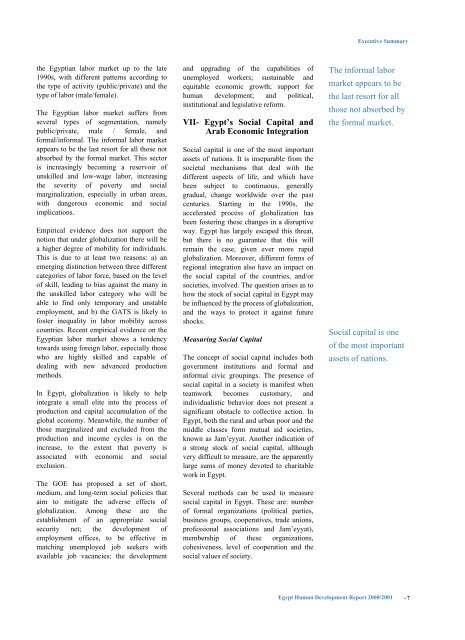English - Human Development Reports - United Nations ...
English - Human Development Reports - United Nations ...
English - Human Development Reports - United Nations ...
Create successful ePaper yourself
Turn your PDF publications into a flip-book with our unique Google optimized e-Paper software.
Executive Summarythe Egyptian labor market up to the late1990s, with different patterns according tothe type of activity (public/private) and thetype of labor (male/female).The Egyptian labor market suffers fromseveral types of segmentation, namelypublic/private, male / female, andformal/informal. The informal labor marketappears to be the last resort for all those notabsorbed by the formal market. This sectoris increasingly becoming a reservoir ofunskilled and low-wage labor, increasingthe severity of poverty and socialmarginalization, especially in urban areas,with dangerous economic and socialimplications.Empirical evidence does not support thenotion that under globalization there will bea higher degree of mobility for individuals.This is due to at least two reasons: a) anemerging distinction between three differentcategories of labor force, based on the levelof skill, leading to bias against the many inthe unskilled labor category who will beable to find only temporary and unstableemployment, and b) the GATS is likely tofoster inequality in labor mobility acrosscountries. Recent empirical evidence on theEgyptian labor market shows a tendencytowards using foreign labor, especially thosewho are highly skilled and capable ofdealing with new advanced productionmethods.In Egypt, globalization is likely to helpintegrate a small elite into the process ofproduction and capital accumulation of theglobal economy. Meanwhile, the number ofthose marginalized and excluded from theproduction and income cycles is on theincrease, to the extent that poverty isassociated with economic and socialexclusion.The GOE has proposed a set of short,medium, and long-term social policies thataim to mitigate the adverse effects ofglobalization. Among these are theestablishment of an appropriate socialsecurity net; the development ofemployment offices, to be effective inmatching unemployed job seekers withavailable job vacancies; the developmentand upgrading of the capabilities ofunemployed workers; sustainable andequitable economic growth; support forhuman development; and political,institutional and legislative reform.VII- Egypt’s Social Capital andArab Economic IntegrationSocial capital is one of the most importantassets of nations. It is inseparable from thesocietal mechanisms that deal with thedifferent aspects of life, and which havebeen subject to continuous, generallygradual, change worldwide over the pastcenturies. Starting in the 1990s, theaccelerated process of globalization hasbeen fostering these changes in a disruptiveway. Egypt has largely escaped this threat,but there is no guarantee that this willremain the case, given ever more rapidglobalization. Moreover, different forms ofregional integration also have an impact onthe social capital of the countries, and/orsocieties, involved. The question arises as tohow the stock of social capital in Egypt maybe influenced by the process of globalization,and the ways to protect it against futureshocks.Measuring Social CapitalThe concept of social capital includes bothgovernment institutions and formal andinformal civic groupings. The presence ofsocial capital in a society is manifest whenteamwork becomes customary, andindividualistic behavior does not present asignificant obstacle to collective action. InEgypt, both the rural and urban poor and themiddle classes form mutual aid societies,known as Jam’eyyat. Another indication ofa strong stock of social capital, althoughvery difficult to measure, are the apparentlylarge sums of money devoted to charitablework in Egypt.Several methods can be used to measuresocial capital in Egypt. These are: numberof formal organizations (political parties,business groups, cooperatives, trade unions,professional associations and Jam’eyyat),membership of these organizations,cohesiveness, level of cooperation and thesocial values of society.The informal labormarket appears to bethe last resort for allthose not absorbed bythe formal market.Social capital is oneof the most importantassets of nations.Egypt <strong>Human</strong> <strong>Development</strong> Report 2000/2001 - 7
















